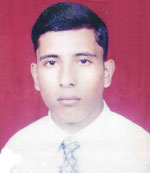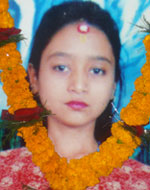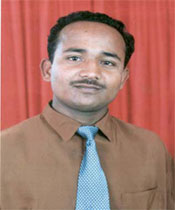Related Links
Case Updates
Krishna Adhikari
 On 6 June 2004, Krishna Prasad Adhikari, a resident of Fujel village of Gorkha District, was murdered in Chitwan District by Maoist cadres. Krishna Prasad was visiting his grandparents after having taken the SLC examinations, and he was abducted from Bakullahar Chowk by men who came on a motorcycle ...
On 6 June 2004, Krishna Prasad Adhikari, a resident of Fujel village of Gorkha District, was murdered in Chitwan District by Maoist cadres. Krishna Prasad was visiting his grandparents after having taken the SLC examinations, and he was abducted from Bakullahar Chowk by men who came on a motorcycle ... Maina Sunuwar
 Around 6 am on February 17, 2004, a group of RNA soldiers arrested Ms
Maina Sunuwar, a 15-year-old schoolgirl of Kharelthok VDC-6, Kavre
district. She disappeared since her arrest. Her family members, with
support from villagers and school where Maina was a student, visited
detention centers ...
Around 6 am on February 17, 2004, a group of RNA soldiers arrested Ms
Maina Sunuwar, a 15-year-old schoolgirl of Kharelthok VDC-6, Kavre
district. She disappeared since her arrest. Her family members, with
support from villagers and school where Maina was a student, visited
detention centers ... Sanjeev Kumar Karna
 Sanjeev Kumar Karna was one among the 11 persons arrested on October 8, 2003. On that fateful day, they had gone to attend a picnic program organized by the students at a place called Kariyachauri VDC-4, and from picnic, they went to Kataiya Chowri Area of Dhanusha district where they ate some food ...
Sanjeev Kumar Karna was one among the 11 persons arrested on October 8, 2003. On that fateful day, they had gone to attend a picnic program organized by the students at a place called Kariyachauri VDC-4, and from picnic, they went to Kataiya Chowri Area of Dhanusha district where they ate some food ... Arjun Bahadur Lama
Hari Prasad Bolakhe
Sarala Sapkota
Birendra Shah
Bishwanath Parajuli, Tom Nath Poudel and Dhan Bahadur Tamang
Chot Nath Ghimire and Shekhar Nath Ghimire
Bhauna Tharu
AF and ICJ Convened Dialogue on Transitional Justice, NAP II, Reparation and Confidentiality Concerns
The event drew a diverse array of participants, including representatives from civil society, conflict victims, and legal experts.
Laxmi Pokhrel, National Legal Advisor at ICJ, provided updates on the current status of the Transitional Justice Bill, emphasizing gender concerns and the necessity of aligning laws with international standards.
Anupa Aryal, Programme Coordinator at AF shed light on women's peace and security concerns, particularly highlighting Nepal's Second National Action Plan (NAP II) and its implementation status to address issues outlined in UN resolutions 1325 and 1820.
Advocate Raju Chapagain, in his presentation on reparation policy, underscored gaps and opportunities for civil society and survivors in Lumbini Province. Chapagain led the discussions around the challenges of implementing reparation measures, discrepancies in distribution, and the lack of coordination among government levels.
Participants, through group discussions and presentations, highlighted crucial recommendations, including the immediate formulation of reparative laws, prioritizing victim participation, and ensuring access to social security and healthcare for conflict victims. Additionally, concerns regarding women victims' confidentiality and access to reparation were addressed, with calls for comprehensive policies and support mechanisms.
The event concluded with a strong sense of collective responsibility and commitment to advocacy. Participants reaffirmed their determination to engage with relevant authorities, advocate for policy reforms, and ensure the effective implementation of initiatives like NAP II. The meeting highlighted the importance of continuous efforts, collaboration, and strategic advocacy to address the multifaceted needs of conflict victims comprehensively.
























Join Us